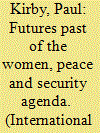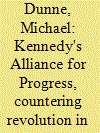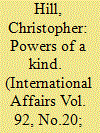|
|
|
Sort Order |
|
|
|
Items / Page
|
|
|
|
|
|
|
| Srl | Item |
| 1 |
ID:
145277


|
|
|
|
|
| Summary/Abstract |
This article interrogates the sexual ideology of Finnish peacebuilding, the country's foreign policy brand and the Women, Peace and Security (WPS) agenda by examining the experiences of women ‘written out of history’. Using the method of ‘writing back’ I juxtapose the construction of a gender-friendly global peacebuilder identity with experiences in Finland after the Lapland War (1944–45) and in post-conflict Aceh, Indonesia (1976–2005). Although being divided temporarily and geographically, these two contexts form an intimate part of the abjected and invisible part of the Finnish WPS agenda, revealing a number of colonial and violent overtones of postwar reconstruction: economic and political postwar dystopia of Skolt Sámi and neglect of Acehnese women's experiences in branding the peace settlement and its implementation as a success. Jointly they critique and challenge both the gender/women-friendly peacebuilder identity construction of Finland and locate the sexual ideology of WPS to that of political economy and post-conflict political, legal and economic reforms. The article illustrates how the Finnish foreign policy brand has constructed the country as a global problem-solver and peacemaker, drawing on the heteronormative myth of already achieved gender equality on the one hand and, on the other, tamed asexual female subjectivity: the ‘good woman’ as peacebuilder or victim of violence. By drawing attention to violent effects of the global WPS agenda demanding decolonialization, I suggest that the real success of the WPS agenda should be evaluated by those who have been ‘written out’.
|
|
|
|
|
|
|
|
|
|
|
|
|
|
|
|
| 2 |
ID:
145279


|
|
|
|
|
| Summary/Abstract |
The Women, Peace and Security (WPS) agenda has developed at the United Nations over the course of the past 15 years, and there have been critical engagements with it for nearly as long. In this article, we first take stock of the operationalization of the WPS agenda, reviewing its implementation across a number of sectors. In the second section, we expose the tensions that have marked the WPS agenda from the start. With others, we argue that there has been a narrowing of the agenda's original scope, reducing it to the traditional politics of security rather than reimagining what security means. We highlight this reduction primarily through an analysis of the tension between the ‘participation’ and ‘protection’ pillars of the agenda. Further, we argue that the WPS agenda faces a current challenge in terms of the actors entrusted with it. Although in some ways involving civil society, the consolidations and implementation of WPS principles at the national and international levels have become increasingly state-centric. Third, we imagine some possible futures of the agenda, from a trajectory characterized by increasing marginalization or even irrelevance, to new avenues like the emergent, albeit tentative, ‘Men, Peace and Security’ agenda. We close with an argument for a revival of the WPS agenda beyond a fixation on states, beyond a narrow heteronormative or essentialist focus on the ‘Women’ of the WPS resolutions, and moving towards the radical reimagining of security as peace that inspired the original architects of these important resolutions.
|
|
|
|
|
|
|
|
|
|
|
|
|
|
|
|
| 3 |
ID:
145273


|
|
|
|
|
| Summary/Abstract |
The United Nations Security Council has often been identified as a key actor responsible for the uneven trajectory of the international Women, Peace and Security (WPS) agenda. It is, however, the Council members—who also seek to advance their national interest at this intergovernmental forum—that are pivotal in the Council's deliberations and shape its policies. Yet, little attention has been paid to this aspect of deliberative politics at the Council in feminist scholarship on WPS. This article seeks to address this gap in the literature. It notes that gender has increasingly become part of foreign policy interests of UN member states, as evidenced by practices such as invocation of ‘women's rights’ and ‘gender equality’ in broader international security policy discourse. The article demonstrates that this national interest in gender has featured in WPS-related developments at the Security Council. Using specific illustrations, it examines three sets of member states: the permanent and non-permanent members as well as non-members invited to take part in Council meetings. The main argument of this article relates to highlighting member states’ interests underpinning their diplomatic activities around WPS issues in the Security Council, with the aim to present a fuller understanding of political engagements with UNSCR 1325, the first WPS resolution, in its institutional home.
|
|
|
|
|
|
|
|
|
|
|
|
|
|
|
|
| 4 |
ID:
145275


|
|
|
|
|
| Summary/Abstract |
The European Union is seen to operate at the international level by promoting ideas and values, rather than by exerting military or economic power. As a gender actor, the EU has played a key role in the development of formal equality, which is presented as a foundational principle of European integration. It therefore follows that normative power Europe should seek to promote these values in external affairs. This article interrogates the role of the EU as a normative gender actor in relation to its implementation of the Women, Peace and Security (WPS) agenda, set out in UN Security Council Resolution 1325 and related resolutions. Documentary analysis will be supplemented by a detailed assessment of speeches and public statements about the role of the EU as a gender actor in external affairs. This data will be used to assess whether there is a disjuncture between the dominant narrative about gender equality as a fundamental value of the EU and the actions of the organization. It will also allow us to assess whether gender mainstreaming is a tool for public diplomacy or has made a significant change to the way the external relations agenda is formulated and implemented. Additionally, the article will draw attention to the institutional obstacles to the EU performing a role as a gender actor in external affairs. It identifies a critical tension between framing the WPS resolutions as an extension of the EU's equality on the one hand, and understanding that gender mainstreaming is a mere policy tool in international affairs. In doing so, it highlights how competing institutional demands can ultimately undermine core values (e.g. equality) when they are used instrumentally.
|
|
|
|
|
|
|
|
|
|
|
|
|
|
|
|
| 5 |
ID:
145282


|
|
|
|
|
| Summary/Abstract |
Within weeks of his inauguration in January 1961, President John F. Kennedy proposed an Alliance for Progress: a $100 billion programme of economic, political and social development for Latin America. Its purpose was to tackle the causes presumed to have sparked the Cuban revolution, chiefly poverty and bad governance, and within half a year every Latin American state except Cuba committed to the goals of the Alliance. But within a few years even proponents of the Alliance doubted its efficacy, a pessimism which increased during the presidency of Lyndon Johnson, and more so under Richard Nixon. This review of the contemporary and historical literature on the Alliance sets that scholarship within the broader area of US–Latin American relations, with particular emphasis on US–Cuban relations from the 1960s until the twenty-first century. An important sub-theme is the peculiarity, the ‘exceptionalness’ of American political rhetoric, derived from and in turn shaping Americans’ sense of the history and the foreign relations of the US: the ‘American mission’ to the world.
|
|
|
|
|
|
|
|
|
|
|
|
|
|
|
|
| 6 |
ID:
145280


|
|
|
|
|
| Summary/Abstract |
Since the loss of their empires, Britain and France have been seen as states in historical but still only relative decline: no longer great powers but not typical of the large category of middle-range powers. Despite financial constraints and limited size they retain their status as permanent members of the UN Security Council and continue to display the ambition to exert global influence. At times, London and Paris deal with this anomaly by acting in harness but at others their foreign policies diverge dramatically, not least because of the contrasting domestic traditions from which they emerge, and because of their differing roles within the European Union. This article assesses the capacity of these two notable states to maintain a leading role in international politics given their own uneasy relationship and the significant constraints which they now face, both external and internal. The article is a revised version of the Martin Wight Memorial Lecture, held at Chatham House, London, on 3 November 2015.
|
|
|
|
|
|
|
|
|
|
|
|
|
|
|
|
| 7 |
ID:
145276


|
|
|
|
|
| Summary/Abstract |
The aim of the eight Women, Peace and Security (WPS) United Nations Security Council resolutions, beginning with UNSCR 1325 in 2000, is to involve women in peacebuilding, reconstruction and gender mainstreaming efforts for gendered equality in international peace and security work. However, the resolutions make no mention of masculinity, femininity or the LGBTQ (lesbian, gay, bisexual, transgender and queer) population. Throughout the WPS architecture the terms ‘gender’ and ‘women’ are often used interchangeably. As a result, sexual and gender-based violence (SGBV) tracking and monitoring fail to account for individuals who fall outside a heteronormative construction of who qualifies as ‘women’. Those vulnerable to insecurity and violence because of their sexual orientation or gender identity remain largely neglected by the international peace and security community. Feminist security studies and emerging queer theory in international relations provide a framework to incorporate a gender perspective in WPS work that moves beyond a narrow, binary understanding of gender to begin to capture violence targeted at the LGBTQ population, particularly in efforts to address SGBV in conflict-related environments. The article also explores the ways in which a queer security analysis reveals the part heteronormativity and cisprivilege play in sustaining the current gap in analysis of gendered violence.
|
|
|
|
|
|
|
|
|
|
|
|
|
|
|
|
| 8 |
ID:
145272


|
|
|
| 9 |
ID:
145281


|
|
|
|
|
| Summary/Abstract |
In the fifteen years since the publication of the report ‘The Responsibility to Protect’ by the International Commission on Intervention and State Sovereignty, there has been a burgeoning literature on all aspects of R2P. This review article focuses on five issues. First, it revisits the shift from ‘humanitarian intervention’ to R2P as the key innovation in 2001, highlighting the political, conceptual, normative, procedural and operational differences between the two. Second, it examines the state of knowledge regarding the causes of atrocities; the institutional vulnerabilities and points of resilience; the pathways from simmering animosities to mass killings; the indicators and precursors; and the most effective preventive and response mechanisms. Third, it reviews the unsatisfactory state of R2P implementation. Fourth, it discusses the main R2P actors, from international organizations and key groups of states to individuals. Finally, it addresses the continuing scepticism about R2P, in that it does not resolve all the dilemmas of how outsiders can provide timely, decisive and effective assistance to any group in need of protection.
|
|
|
|
|
|
|
|
|
|
|
|
|
|
|
|
| 10 |
ID:
145274


|
|
|
|
|
| Summary/Abstract |
Recognizing the critique of sexual essentialism in the Women, Peace and Security (WPS) agenda, this article moves beyond this familiar narrative to address the narrowness of conflict frames that have to date been engaged by the WPS agenda. The events of 11 September 2001 brought new urgency and vibrancy to state action in the realm of counterterrorism. This momentum was illustrated both by the response of national legal systems and by more concerted efforts to achieve multilateral and multilevel counterterrorism cooperation on the international level. Notably, terrorism and counterterrorism have long been of only marginal interest to mainstream feminist legal theorists. Until recently concerted analytical feminist scrutiny has been missing in the assessment of terrorism, radicalism and counterterrorism discourses. This article addresses the lack of attention to terrorism, counterterrorism and countering violent extremism (CVE) initiatives in the WPS mandate and its consequences for mainstreaming gender interests in foundational aspects of peace and security practice. Recent normative augmentations including UNSCR 2242 and the amplified mandate of the Counter-Terrorism Committee to include gender considerations are assessed. The article argues that these moves to include gender come late, and on the terms set by security-minded states. The late attention to gender in counterterrorism leaves little capacity to produce an inclusive and reimagined feminist agenda addressing the causes conducive to the production of terrorism and the costs to women of counterterrorism strategies. This pessimistic assessment warns of the pitfalls of exclusion and inclusion in the new security regimes that have been fashioned post 9/11 by states.
|
|
|
|
|
|
|
|
|
|
|
|
|
|
|
|
| 11 |
ID:
145278


|
|
|
|
|
| Summary/Abstract |
Since the adoption of UN Security Council Resolution 1325, the woman-in-conflict has emerged as a central figure in the discourse of the UNSC Women, Peace and Security policy community. She is an ever-present referent in discussions, the person in whose name critique is launched or action demanded. This figure is a representation of the needs and interests of the uncountable, faceless and nameless women affected by and living through war; a representation that takes place through imbuing her with particular meaning or characteristics. These meanings shape how the figure is understood in Women, Peace and Security discourse, which, in turn, constructs the horizons of possibility for both current and future policy and its implementation. This article explores how this figure is produced as a subject through layers of representation and is deeply embedded in the practices and relationships of power in the policy community. It suggests that accounting for these will offer an opportunity for feminist advocates to engage in this institutional space in more considered and effective ways.
|
|
|
|
|
|
|
|
|
|
|
|
|
|
|
|
|
|
|
|
|